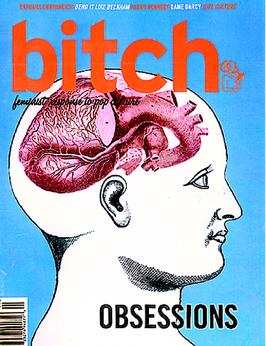My only real bitch concerns the article by Noy Thrupkaew on slash fiction. One infamous example of this subgenre of fan fiction which is produced and consumed primarily by women centers on Kirk and Spock getting' it on. Although slash fiction has splintered into more than gay matchup stories, my problem was the degree to which Thrupkaew applies high falootin' sociological window dressing to the perverted, giggling, middle-school-girl thrill derived from gay sex scenarios with masculine archetypes. (Not that Kirk isn't the intergalactic poster boy for what my friend Renee would call a “himbo,” and god knows guys have gotten their jollies fantasizing about women with other women.)
My only other gripe is purely subjective, and centers on the magazine's examination of some really bad television, such as an open letter to Fox about such vomit-inducing fare as “Who Wants to Marry a Millionaire?” I say this having never actually seen the show, but I think I like myself too much to go through that. My problem is that, aside from watching a movie on my VCR once a month or so, I consider television, on the whole, to be beyond redemption. It does, of course, make perfect sense to address it in a magazine devoted to pop culture.
Their letters column, “Dear Bitch,” is a provocative forum. I particularly enjoyed the debate over the magazine's coverage of the way some women are reinventing pornography. In the “Love it/Shove it” section, Jessica Hoffman takes offense at the notion that all women are born to be pacifists; the editors rag on what sounds like a grotesque magazine dedicated to Jane Pratt; and Diane Anderson-Minshall gives kudos to, of all things, a Fox show called “Fastlane” for its intelligent handling of lesbianism, plus more.
My favorite interview was with “zine queen,” novelist and historical writer, Pagan Kennedy. There was another one with the bizarre and fascinating multi-talented underground cartoonist, Trina Robbins; another with Bend It Like Beckham director Gurinder Chadha; one with Girl Culture author Lauren Greenfield; and still another with writer and activist Barbara Ehrenreich.
Maria Raha dares to suggest that the concern about Afghan women in the media was a Republican ploy to build support for war, hard as that may be to believe, while record collector Layla Cooper's “Lost in the Grooves” examines the largely male phenomenon of record collecting.
There is no filler in this quarterly magazine, and a great deal of fine writing about highly relevant subjects. Male, female, straight or gay, if you fancy yourself as having even half a clue, you've got to get your hands on an issue of Bitch.









